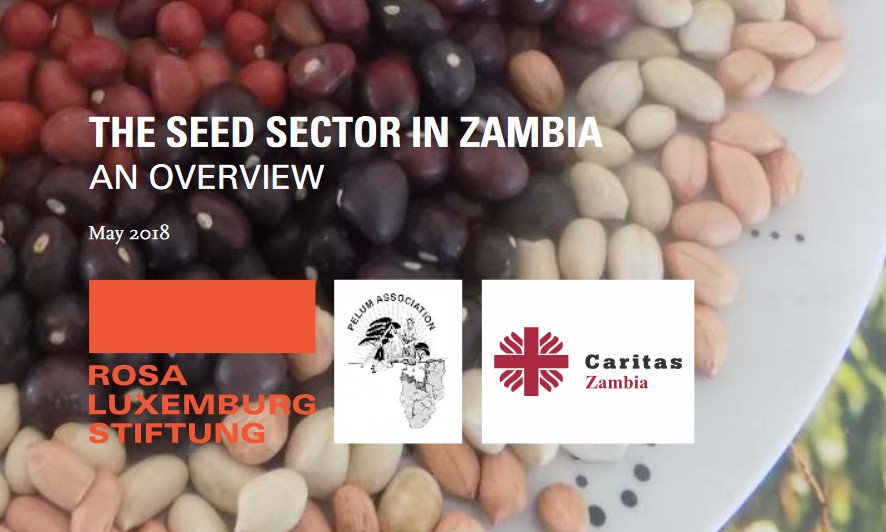Caritas Zambia, PELUM Zambia hosted a meeting reflecting on national and regional seed law reforms. The meeting brought together different CSOs and farmers concerned on seed law reforms in the seed sector.
We acknowledge and appreciate Government's vision to promote diversification in the agriculture sector by promoting, among other measures, the use of improved crop varieties and certified seed. We also recognize and appreciate the existence of legislation to further support diversification such as the Plant Breeder's Right Act and Plant Variety and Seed Act No. 21 of 1995 which provides for regulation, control, production, sale and import of seed as well as testing and for minimum standards of germination and purity. Above all, we appreciate Government's recognition of the existence of the formal and informal seed sector.
However, we, Caritas and PELUM Zambia, together with the key stakeholders from the meeting are concerned about the limited focus on farmer rights and seed sovereignty. Seed sovereignty includes the farmer's rights to save, breed and exchange seeds, to have access to diverse traditional open-pollinated seeds which can be saved, replanted and which are not genetically modified, owned or controlled by emerging seed giants. Seed sovereignty recognises the importance of Farmer Saved Seed Systems (FSSS) which is essential for food security at the household level as the commercialised seed is mainly accessible to those farmers with some disposable income and is able to purchase them. This creates a gap in boosting food security for most rural households .
Besides displacing and destroying diversity, commercialised seed varieties are also undermining seed sovereignty and farmers rights. Furthermore, the multinational capture of local seed companies is a process that has long been underway in most parts of Africa and is marginalising the local seed companies which in most cases promote the open-pollinated seed varieties. Across Africa, new seed laws are being introduced which enforce compulsory registration of seeds with a bias towards Distinct Uniform Stable (DUS) which the traditional seed varieties do not conform to, thus making it impossible for small-scale farmers to grow their own diverse traditional seed as seed but rather grain , and forcing them into dependency on the giant seed corporations which mainly grow hybrid seed which cannot be recycled and depends heavily on synthetic chemical fertilisers and pesticides not friendly to the environment.
Therefore, in view of the above concern s and in the context of our quest for socio-economic and environmental justice, we the CSOs make the following resolutions:
Awareness rising: We appeal to relevant institutions such as Seed Control and Certification Institute (SCCI) to exercise their mandate of providing information to the general public, farming community and those affected by the changes taking place within the seed sector in Zambia. We urge the government to dialogue with various stakeholders including farmers in all issues related to seed reforms and implementation. We stand in solidarity with the farmers by sharing information and capacity building and education to make them more informed, empower ed to make the right decisions on issues that affect them such as seed law reforms. We envisage a seed sector that emphases and respects the role played by women who have been custodians of seed and biodiversity conservationist in African traditional society .
National seed policy; with the introduction of a number of reforms and protocols at regional level. We appeal to the government to consider finalising the draft national policy of 1999 which would regulate the sector. We hope to see a decentralised consultative process to this process and the effective recognition of farmer’s rights and the support of farmer managed seed systems which are to be supported by policy to reduce restrictions during trade, as currently trade can’t go beyond achieving economic benefits. Further, there is a need for the development of regulations that protect our diverse genetic resource and traditional knowledge and ensure that the benefit-sharing System is inclusive and implemented .
Lobby for space in all consultative processes: There is a need for a formal platform to be created that will allow for effective CSO and farmer participation in policy formulation and decision making to ensure that farmer ' voices are heard. We request for space at all levels horizontally and vertically by a more diverse CSO that will allow for more and effective CSO representation and participation. Consultative engagements and representation of key stakeholders is key in achieving seed sovereignty, and this responsibility lies with national governments who should ensure that the rights of the farmers are recognised and protected in national policies and legislation for the sake of national building and social and economic development.
The entire Policy brief on the Seed Sector can be found and downloaded here http://caritaszambia.org/phocadownload/policy_briefs/CSOs-concerns-on-seed-sector-reforms.pdf


